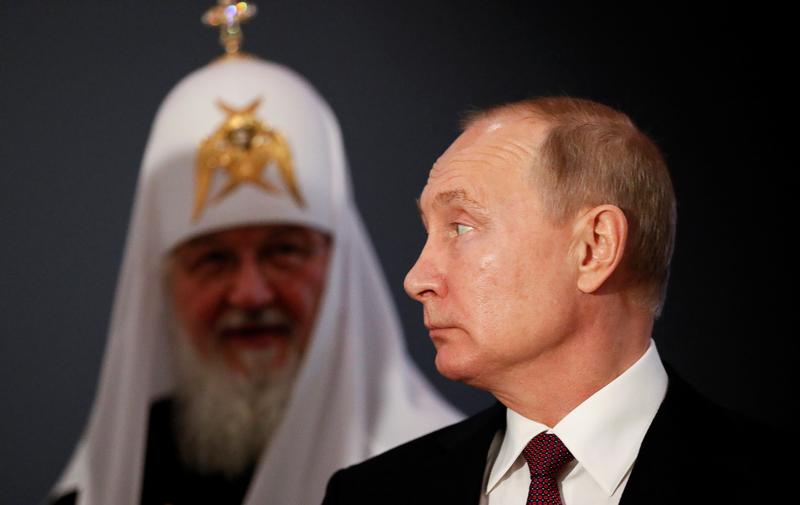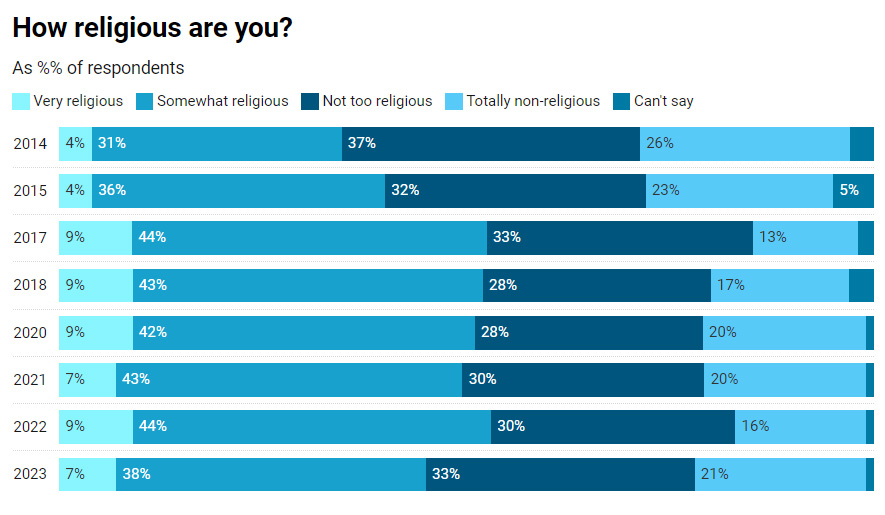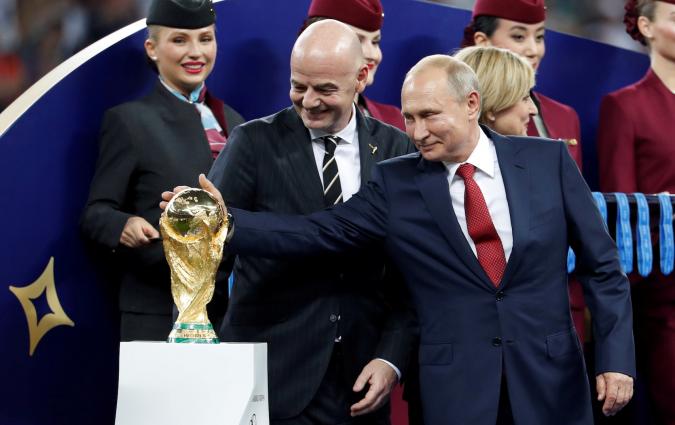In this piece
From pulpit to propaganda machine: tracing the Russian Orthodox Church’s role in Putin’s war

Russian President Vladimir Putin and Patriarch Kirill of Moscow and All Russia on the National Unity Day in Moscow, Russia November 4, 2019. REUTERS/Shamil Zhumatov/Pool
In this piece
Russkiy mir: merging nationalism with faith | A symbiotic relationship: church and state | Downplaying peace | Metaphysical warfare | Calls to sacrifice | Victory rhetoric | Influence on Russian society and public opinion | Conclusion: A complex tapestry of religion and politicsIn the hallowed halls of Moscow's Cathedral of Christ the Saviour, Patriarch Kirill, the head of the Russian Orthodox Church, told congregants that 2022 should be a year of peace.
“Any violation of peace, which is the result of people’s cruelty, inflicts enormous damage on human life,” he told attendees of his New Year’s service on 31 December 2021.
Just 55 days later, Russia launched its full-scale invasion of Ukraine. Since then, Kirill has become one of the key advocates for the war, providing moral and ideological justification for what Russian authorities called their “special military operation”.
Of course, it is not unprecedented for religious institutions to serve the interests of authorities: the Catholic Church supported Mussolini in Italy, the Dutch Reformed Church backed Apartheid in South Africa, and Buddhist monks incited violence against the Rohingya in Myanmar.
These examples underscore the complex relationships between religious institutions and political power, highlighting the potential for collaboration, complicity, or manipulation to serve various unrighteous interests.
The role of journalists, in all of these instances, is to collect and analyse evidence so that these institutions can be called to account.
To catalogue Kirill’s support for Kremlin’s military actions, I pored over the text of 58 sermons he delivered between February 2022 and May 2023. These sermons were not only delivered to parishioners in churches but also broadcast weekly to millions of viewers via state-controlled Channel One TV programme, Word of a Pastor (Slovo pastyrya).
It would have been naive to expect acts of resistance from the head of the Russian Orthodoxy, who just over a decade ago called Putin’s era a “miracle of God”. However, the extent of the involvement of the Church and its Patriarch in Russia’s wartime propaganda machinery has been more flagrant than even the most jaded observer might have predicted.
Four rhetorical themes emerge in Kirill’s statements: downplaying peace, the metaphysical struggle myth, exhortation to sacrifice, and allusions to historic victories. There are no strict borders between these stages; they appear intertwined throughout February 2022 to May 2023, but we can see how the stress on particular topics shifted depending on political circumstances.
To understand the rhetoric, we must first explore how Russkiy mir (“Russian world”) became a concept central to both Russian political and religious messaging.
Russkiy mir: merging nationalism with faith
Central to the Church's alignment with Putin's war rhetoric is the concept of Russkiy Mir, or the “Russian World”. Emerging at the start of the 1990s, it was a response to resentment about the collapse of the USSR and a desire to recreate a Russia that would be “politically and geographically bigger than the Russian Federation”.
Over the next three decades, the meaning of the term Russkiy Mir shifted from the sphere of geopolitical influence to the idea of the sacral land. Patriarch Kirill has been instrumental in promoting this narrative, portraying Russia as a defender of traditional Christian values against a backdrop of Western liberalism and moral relativism.
The Russkiy Mir concept transcends geographical boundaries, encompassing not just Russia but all territories associated with historical Russian influence, including Ukraine. By framing the conflict in Ukraine as a battle for the soul of the Russian civilisation, Kirill has effectively sanctified the war, granting it a veneer of divine legitimacy.
A symbiotic relationship: church and state
The relationship between Patriarch Kirill and President Putin transcends the conventional bounds of church-state interactions. While it's easy to perceive Kirill as a mere pawn in Putin's political game, the reality is far more complex. The Church has leveraged its moral authority to reassert itself in the post-Soviet social landscape, championing the cause of Orthodox unity and Russian imperialism.
This agenda dovetails neatly with Putin's political ambitions, particularly his vision of a resurgent Russia, reasserting its influence over its former territories. The Church's endorsement of Putin's actions in Ukraine thus serves a dual purpose: it bolsters the Kremlin's narrative while simultaneously advancing the Church's own interests in the region.
Downplaying peace
The Russian Orthodox Church, as an institution, has seen a significant shift in its approach to the concept of peace and pacifism. In early 2022, Kirill modestly called for peace, urging for a reduction in the confrontation between Russians and Ukrainians. However, as the war progressed, these calls have been subtly aligned with the Kremlin's goals. For instance, in September 2022, during a mobilisation drive, Kirill argued against the concept of Western pacifism, advocating for a 'justice-based' peace that aligns with Russian political objectives.
The case of Yoann Koval, a priest at St. Andrew’s, who was defrocked for replacing "victory" with "peace" in a prayer, underscores the Church's rigid stance against pacifism. This incident highlights how the Church, mirroring state policies, has made the word "peace" almost undesirable in its rhetoric.
Metaphysical warfare
Patriarch Kirill has framed the conflict as a metaphysical struggle, positioning Russia as a spiritual and holy nation in opposition to the sinful and devilish West. He has linked the war to a cosmic battle of good versus evil, elevating Russia's role to a divine mission. This narrative not only demonises the West but also portrays Ukraine as an instrument being used by Western powers against Russia.
Kirill's rhetoric often includes criticism of Western values, particularly LGBTQ+ rights, painting them as antithetical to Russian spirituality and morality. By propagating the myth of protecting traditional values and Russian identity, the Church assists the Kremlin in ingraining the idea among the public that the war against Ukraine is justified.
Calls to sacrifice
Kirill has been a vocal advocate for the concept of sacrifice in the context of the Russia-Ukraine conflict. He consistently intertwines religious teachings with a sense of "patriotic" duty, particularly emphasising the notion of self-sacrifice among Russian soldiers. A recurring theme in his sermons is the quote from the Gospel of John 15:13, "Greater love has no one than this, that someone lay down his life for his friends." This verse is used to reinforce the belief that dying for one's nation is the ultimate expression of love and loyalty.
Following Russia's mobilisation announcement in September 2022, Kirill's rhetoric on sacrifice intensified. He suggested that soldiers who die in combat are performing a holy act, equivalent to a religious sacrifice. "If somebody, driven by a sense of duty and the necessity to fulfil an oath, remains faithful to their calling and dies in the performance of this duty, then they undoubtedly are committing an act equivalent to sacrifice," he stated, implying that such deaths absolve one of sins.
Kirill also extends the call for sacrifice beyond the military, urging the entire Russian population towards a form of “spiritual mobilisation”. He advocates for widespread support of the military, suggesting that sacrifice is not merely the responsibility of soldiers but a collective national duty. This blurring of religious and war lines further demonstrates the Church's role in bolstering the Kremlin's course on militarisation.
Victory rhetoric
Finally, Patriarch Kirill's sermons have increasingly emphasised the theme of victory. He often invokes historical and religious imagery to frame the conflict as a continuation of Russia's spiritual and military legacy. For example, in a sermon on May 6, 2023, he drew parallels between the victory over Nazi Germany and the current conflict, suggesting a divine mandate in Russia's actions against Ukraine. "Once again the enemy takes up arms against Holy Rus’," he declared, linking past glories to the present situation.
His speeches frequently call for prayers for Russian authorities and military success, underscoring President Putin's central role in this perceived historic struggle. On September 12, 2022, Kirill focused on Putin's leadership: "Our special prayer is for the head of our state, the Supreme Commander-in-Chief Vladimir Vladimirovich Putin, who bears a special responsibility, as well as for all military leaders and those in power."
Moreover, Kirill's approach to victory goes beyond mere spiritual guidance; he advocates for practical support for the military. This active involvement of the Church in state affairs reflects a deep integration of religious and national agendas.
Influence on Russian society and public opinion
The rising influence of the Orthodox Church in Russia's socio-political fabric is evident from recent surveys by the Levada Center, an independent Russian research organisation. These surveys indicate an increase in the number of Russians identifying as Orthodox Christians and a growing trust in religious institutions. This resurgence of faith coincides with a rise in nationalist sentiment, suggesting a symbiotic relationship between the Church's messaging and the state's political agenda.

Levada Center Survey of “Religious beliefs”, published in June 2023, shows the number of respondents describing themselves as very or somewhat religious has grown from 35% in 2014 to 45% in 2023.
However, assessing the true impact of the Church's involvement in state propaganda is complex. The nature of public opinion in an authoritarian regime, where free expression is often curtailed, makes it difficult to gauge the genuine sentiments of the populace. Nonetheless, the increased visibility and influence of the Church in public and political discourse are unmistakable.
Conclusion: A complex tapestry of religion and politics
The role of the Russian Orthodox Church in advancing Putin's war messaging is a vivid illustration of the complex interplay between religion and politics. Patriarch Kirill's vocal advocacy for the war reflects a strategic alignment with state objectives, underscoring the Church's significant influence in shaping public opinion.
This involvement, however, is not without its challenges and internal dissent, highlighting the ongoing tension within the Church between its spiritual mission and political ambitions. As the conflict in Ukraine continues, the Church's role in supporting the Kremlin's narrative remains a critical factor in understanding the broader dynamics of the war and its impact on Russian society.
In this context, journalists and scholars have a vital role in dissecting and analysing these intersections of religion and politics, ensuring that the actions and motivations of such powerful institutions are scrutinised and understood in their full complexity.
For Natalia's full analysis, including links to all sermons and speeches, see PDF download.
This project and fellowship have been made possible by the support of the Thomson Reuters Foundation.



